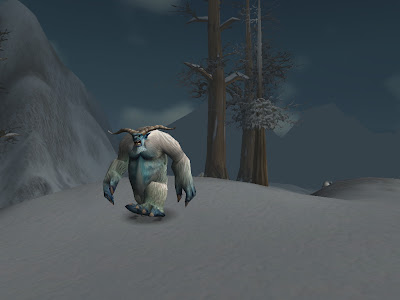
A contingent of Horde warriors maintains a base camp on the green slopes of southern Alterac. Orcs, trolls, tauren, and even a few Forsaken stand ready at all times to enter the snowbound wilderness of the Alterac Valley. Around them bustles the inevitable commotion of any military camp: overseers barking out orders and subordinates desperately trying to comply.
If the “Hidden War” between the Horde and the Alliance ever breaks out into open war (and many expect it will) the most likely cause will be Alterac Valley. While technically a valley, it is still much higher in elevation than most of the continent. The hardy Frostwolf Clan calls this cold and inhospitable place home. The Frostwolf Clan was the sole group of orcs to resist the demonic corruption of their race. For their defiance, the old Horde exiled them to this isolated realm. The Frostwolves settled, trying to avoid attention. Alterac Valley’s once-great mineral resources were long since depleted thanks to the incredibly wasteful projects demanded by the Alteracine lords.
Alteracine soldiers soon discovered the wayward clan. Perhaps due to Alterac’s weak military, and the fact that the Frostwolves stated they had no quarrel with the small nation, Alterac’s Lord Perenolde agreed to ignore the orcish presence. Alterac demanded, however, that the orcs never leave the valley on pain of death. With little choice, the orcs complied. When Alterac fell, the Frostwolves went into hiding and escaped Alliance detection. The clan slowly reestablished itself as law and order broke down across Lordaeron during the Third War.
This is most important for the fact that the Frostwolf Clan is the clan of Thrall. Thrall is technically the chief of the Frostwolves, though his distance and myriad other responsibilities prevent him from ruling it directly; a council of elders manages the day-to-day running of clan affairs. The war over Alterac Valley began with the entry of the Stormpike Army. These dwarves had discovered ancient ruins in the valley, which they hoped held keys to their racial origins. Most accounts state that the Stormpike attacked the moment they saw the orcs there, perhaps assuming they were holdouts from the Second War. Their honor and security challenged, the Frostwolves responded in kind. The Stormpike Army is only an unofficial arm of the Alliance; thus it is not considered a war in the political sense. Yet the orcs grow more angry each day and it is a widely known fact that the Stormpike Army recruits from and is funded by individuals across the Alliance.
The land north of Tarren Mill is much like the Hillsbrad Foothills, though it steeper and rockier. The Alterac Mountains exist as a kind of power vacuum in Lordaeron. Ogres make homes in the ruined city of Alterac, the Syndicate is apparently endemic, and the wizards of Dalaran watch over their shattered city. Most thought that whoever controlled Alterac Valley would eventually command the entire region, though time has proven the region to be less important than first believed. The conflict continues to this day.
I had no intention of traveling to Alterac Valley as my interests lay elsewhere in the land. What I hoped to find in the military base were traveling companions. I waited for two days at the camp, sleeping beneath the banner of the Frostwolf Clan and helping out in various odd jobs.
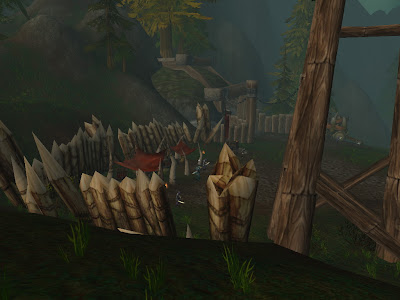
The traveler I eventually found seemed almost too good to be true. Her name was Aldemistra, a relatively undamaged Forsaken who wore a tarnished silver coronet. She was actually the daughter of Lord Gunnur Eldemar, one of the traitorous Alteracine barons. She wanted to go into the ruins to retrieve a keepsake from her youth.
We left before dawn, traveling the increasingly rugged terrain. The road was in terrible condition, having been neglected for over a quarter-century.
“How old were you when Alterac was destroyed?” I asked.
“Hm? Oh, I was around ten years of age, if I recall correctly.”
“Where did you go after Alterac?”
“Lordaeron.” She said it curtly, as if she didn’t really wish to discuss it. I could not really blame her.
 |
| Aldemistra, by Norbert Toth |
Scholars still debate as to exactly why Lord Perenolde of Alterac betrayed the Alliance. Most believe that it was out of fear that the orcs would annihilate the humans, and that his nation’s only chance for survival was to befriend the invaders. Given the horrific cruelty displayed by the Horde during the Second War, this was probably a very short-sighted plan. Perenolde, being of noble descent, was not harmed after the fall of Alterac and was sent to Lordaeron to live out his life in house arrest. What happened afterwards is uncertain, though there are rumors that he willingly joined the Scourge, becoming one of its fearsome death knights.
The nobles under Perenolde were arrested; a few were executed. After the war, the Alliance made plans to give Alterac to an aristocrat named Lord Prestor, but he vanished and the arrangement never materialized.
“What was Alterac like, when it stood? If you don’t mind me asking.”
“I can barely remember. We deserved what happened to us anyway.” Aldemistra spoke in a sort of hopeless resignation.
“The... I’m sorry, do you not wish to discuss this?”
“I do not want to. Perhaps I should, though. Too many Forsaken try to forget the past, even if they remember it.”
“That is true.”
“Lord Perenolde was not the real criminal, I think. He did betray the Alliance, though only to protect his own people. Is that not the duty of a liege to his subjects?”
“What about his duty to humanity?”
“The affairs of his nation was the important thing. And he did much for Alterac. The true villains of our sorry tale were the barons beneath him, especially my father. Do you know of our nation’s history?”
“I am familiar with it, yes.”
Alterac was once a frontier province of the old Arathor Empire, only sparsely inhabited. The humans there lived in fear of attacks from trolls and yeti, and led a wretched existence. A warrior named Kazelan Starrok arrived after the fall of Arathor, rallying the scattered human forces. His lieutenants became lords in the new society. All in all, a typical genesis for a kingdom.
The Starrok dynasty ruled with an iron fist. They demanded all the prestige of the old emperors yet offered none of the statesmanship. Alterac was initially a wealthy nation thanks to the gold deposits in the mountains. However, the arbitrary decrees of the Golden Circle (the name for the assembled nobles) prevented any progress. At one point, the color green was prohibited because of a dream had by Lord Alton Starrok in which a green bird brought doom to his lineage. The nation spent a fortune stripping trees and meadows, along with the executions of any unfortunate caught wearing green. Alton died soon after and his successor reversed the ruling.
Alterac fell farther and farther behind as time progressed. While other nations advanced, the Alteracine acted in much the same way they had through all their history. Some hoped that the end of the Starrok Dynasty would bring changes. While the Perenolde Dynasty was more open to reform, they lacked the support of the Golden Circle and could not do anything to help.
“Then you know why I would consider my father, and my entire family, to be evil. It is appropriate that I am now Forsaken, so that I may better continue in the family legacy.”
“Do you consider yourself evil?”
“I’m a walking corpse, born of dark magic. How could I not be?”
“We can choose our paths.”
“Not I. My path was chosen at birth.”
We soon went past the verdant slopes of the lower mountains. The land above is gray and rocky, and cold winds drive swirls of snow under the clouded skies. It occurred to me that I was getting closer to the Plaguelands, and that the corruption might have spread to Alterac.
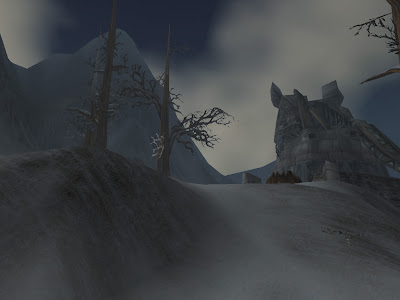
Aldemistra built a small campfire each night. She sat as close to it as she safely could, holding her near-skeletal hands over the flame. Nothing really dispels the inner chill of undeath though some Forsaken never stop trying.
“It must have been a rather hard place to make a home,” I commented, pointing to the snowy wilderness around us. The air is also quite thin, though this did not have a severe effect on either of us.
“It was. Alterac City was scarcely any better. Foreigners call it ‘The City of Bones.’ Do you know the history of the city itself?”
“I know that Alterac was built so high up to fulfill a Starrok’s vanity.”
“Lord Balkem Starrok. He went to Ironforge, the great City in the Mountain of the dwarves. When he got back he decided he wanted to outdo it, so he built the new capitol on the highest plateau.”
“It took centuries to complete, did it not?”
“Nearly five-hundred years. No one kept records, though some think that over a third of Alterac died in the construction. We were a terror to those beneath us long before we betrayed the Alliance. Cruelty... is in my blood.”
“Would you say the same for the common people of Alterac?”
She shrugged.
“Those who suffer oppression are often just as brutal as their masters.”
“There was not much solidarity amongst the peasants then?”
“Not that I observed. But I saw few in my time there. Commoners could only enter Alterac City with permission. You could go through the city at noon and scarcely see a single person on the boulevards. We stayed in our houses mostly.”
I wondered if the peasants were truly as cruel as she said, for she admitted to having seen little of them. Though her previous comment about the cruelty of the oppressed struck true, especially after my own observations of Undercity.
“Was you family a prominent one?”
“We Eldemars are among the greatest houses of Alterac, as even one from Lordaeron ought to know. It was our great ancestor Nomur Eldemar who rode with Kazelan Starrok against the trolls! It is we who are the most honored of the Golden Circle, the Chosen of the Falcon,” she declared.
“I see.” I was rather confused by her reaction.
“Through the grand halls of the Eldemar Manse we are reminded of our glory by statues of our fierce fathers. You would do well to see it when we arrive. In our land the blood of the nobles is pure, unsullied by taint! This is the source of our greatness, something my father would talk about a great deal, usually while drunk on wine.”
Her voice changed mid-sentence. Aldemistra’s posture, which had stiffened, relaxed suddenly.
“Are you feeling quite all right?”
“Yes. Why wouldn’t I be?”
“You were shouting. I didn’t mean to bring up painful memories.”
“My apologies Destron. Sometimes when I remember something, I see it around me, as if I were truly there again. I was still seeing myself as the imperious little girl who once lived in Alterac City.” She did not seem bothered by this.
“Does it happen often?”
“Not often. The houses of the city were strange, all stuffed with gold and jewels. The walls were painted with chaotic, detailed scenes of our legends and history. I remember one that showed an army of trolls, who looked more like a living storm of trolls than an army, falling before Kazelan. It terrified me as a child and I had to walk by it every day.”
“Did you get used to it eventually?”
“Somewhat. Of course, nearly everything in the house was destroyed. I’m only hoping I can find the old family crest. We had a copy displayed prominently over the fireplace but the real one was in a hidden alcove.”
The natural obstacles of the mountains hindered us over the next three days. The road got so bad that it could scarcely be called such. We also had to watch out for patrols of ogres. The Crushridge Ogre Clan moved into the ruins shortly before the Third War. They helped the Forsaken for a while, compelled by a geas of the Dark Lady. They somehow broke free and spent their time since then making the occasional raid into the Uplands, a region now infested by Syndicate operatives.
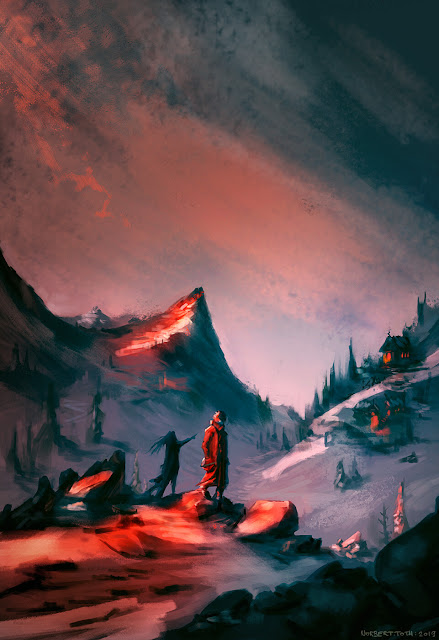 |
| The Alterac Mountains, by Norbert Toth |
The ogres are not native to this world, though you wouldn’t guess that by seeing how easily they’ve adjusted. They are perhaps the only humanoid species more adaptable than trolls. The hulking, simple-minded brutes came through the Dark Portal with the orcs in the First War, and marched with the Horde in the Second. After that they scattered, forming clans all over the world.
*********
We kept to the ridges of the mountains in trying to avoid the ogres. It was night when we reached the ruins. Before us stretched the monument to vanity once called Alterac. Great stone buildings squatted on the snow-covered ground, stripped of all grandeur. Booming roars periodically echoed through the cold and empty streets, the sound of ogres challenging each other and the world.
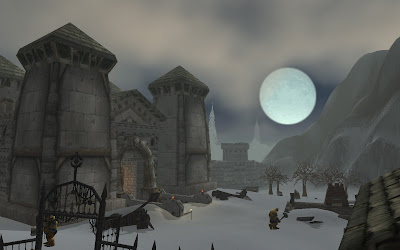
“And here is my old home,” announced Aldemistra. At that moment, snow began to drift down from the sky.
She led the way, moving quickly through broken avenues and ice-cracked houses. I recalled what Aldemistra had told me about the construction of the city, how so many peasants died on the whims of their lords. Perhaps it was poetic justice that Alterac lay ruined. Rough beasts now wander through the halls of the masters. The snowfall increased, as if trying to bury the city once and for all.
“Here we are,” Aldemistra whispered.
She pointed to the tattered facade of a large house. A sizeable portion had caved in, and what remained did not look particularly stable. The open doorway led to a formerly grand foyer. Chunks of the wall had been gouged out, and one corner was blackened from fire.
“We used to have fountains sheathed in the purest gold here. This is why all the soldiers of Lordaeron and Dalaran who destroyed the city became so wealthy afterwards.”
“There are rules against looting.”
“They were not enforced. My traitorous family was splendidly cruel. We entirely deserved it.”
Bitterness tinged her words, along with a curious and hateful satisfaction. Though I feel no sympathy for Alterac or Lord Perenolde, she was but a child when the betrayal happened. She seemed to take strange comfort in saying she and her family were completely depraved and deserving of their suffering. This still didn’t inspire her to redeem herself.
She traveled down the remains of a hallway. The roof and one of the walls were long gone, and the ground was half-buried in gray snow. My foot hit something in the snow and a human skull tumbled out, a few scraps of frozen flesh stuck to the bone.
We came to another room after the hall. The pieces of a broken flight of stairs lay scattered on the floor, some of them buried by the snow drifting through holes in the ceiling. Aldemistra stepped over the chunks of fallen masonry to an open door frame. She quickly jumped to the side, the snow crunching beneath her feet. Aldemistra motioned for me to be silent. I moved closer, to better see the room. She was gone when I turned to look at her.
Had I been led into a trap? The chamber into which she had been looking was occupied by an ogre, who listlessly searched through the rubble. The ogres are almost comical in appearance, looking like giant fat men with exaggeratedly brutish features. What appears to be fat is actually muscle, and they are a fearfully strong species.
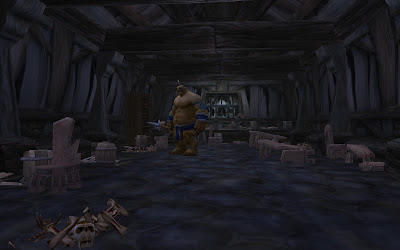
I hid behind a chunk of stairs, trying to find Aldemistra. My eyes caught a faint movement in the chamber’s shadows. The ogre screamed suddenly, an awful sound. It frantically turned around and I saw Aldemistra hanging on from the ogre’s neck, stabbing into it again and again with a wicked-looking dagger. Aldemistra yelled with rage and fury as she repeatedly stuck the beast. Then the ogre slammed its back into a wall and Aldemistra dropped.
I sprung from hiding and fired a series of magical bolts into the ogre. The glowing projectiles sank into its bulk, and it charged me. I scrambled to the side but a huge fist still slammed into my chest, knocking me down. The ogre whirled around with surprising agility, readying the great spear it carried.
I opened a conduit into the Twisting Nether that let me to teleport to the other side of the room. The spear thrust hit only snow. I prepared a fireball once I reappeared. Had I still been human, I think I would have been too distracted by the pain of the blow to effectively defend myself.
Aldemistra ran to the ogre before my spell was complete and sank her dagger hilt-deep behind its knee. It moaned in agony and collapsed while Aldemistra continued her attack. A flailing limb bashed her slender body, flinging her to the side. The beast began crying and yelling in its alien tongue. Something about the creature’s obvious distress disturbed me, and I launched a fireball at its head to stop its misery. I was successful.
I went over to Aldemistra. For a moment I feared she was dead, really dead, her body twisted unnaturally on the floor. However she quickly righted herself. Entering the room where we found the ogre, she hurried to the far end without a word. I heard shouts in the distance, the ogre’s compatriots coming to investigate.
“Hurry! They’re after us.”
“I’ve found it!”
Aldemistra held up a large emblem about the size of a man’s chest. Taking it under her arm we ran. A terrific crash shook the old manse, and we saw the better part of a wall collapse as another ogre punched his way inside. Acting quickly, I used a spell to polymorph the ogre, temporarily turning it into a very confused sheep. Aldemistra began to run towards it, dagger in hand, but I grabbed her arm.
“Let it go!” I yelled.
She resisted at first, but soon complied. The two of us ran through the ruined homes and streets of a dead city, massive ogre figures lurching in the darkness of the night. Fortunately, none of them found us and we managed to escape into the mountains.
“Are you all right?” I asked Aldemistra.
“Yes.”
The next morning greeted us with a cold and gray dawn. Sleet fell from the cast-iron sky for a few hours. I was not sure exactly where we were. Then Aldemistra pointed to a small building situated on a precipice, the stone aged, rough edges worn down by the endless wind. Thinking back to my studies in art and architecture, I guessed that it dated back to before Alterac’s founding. The walls still stood, though the roof was long since gone.
“What is this place?” I asked.
“This was the where Ariamus lived, when he met Kazelan.”
“The founder of the Ariamist heresy.”
“The same.”
The interior was empty, hardly surprising given its state. Aldemistra tiptoed to a snow-filled fireplace and began clearing it out.
It was not long after the creation of the Exegesis of the Holy Light that missionaries began to travel around the continent. Perhaps inevitably, some held very peculiar interpretations of the Exegesis. One such eccentric was a priest named Ariamus who went to the Alterac Mountains in his attempt to spread the Light. His initial mission met with little success, as the people clung to the old human pantheon of Arathor in hopes of smiting their enemies.
He secluded himself in the mountains, endlessly reading the Exegesis. One passage was of special interest to him: “For whomever has joy within himself can bring it to the multitudes. Thus a king or lord can spread his spirit to his subjects. The Light is of all humanity, yet in some ways greatest when a great man allows it to shine, for then there is truly the possibility of enlightenment for the many.” Priests traditionally took that to emphasize the importance of a just ruler, a simple enough conclusion. In his mind, Ariamus decided that it meant that some humans are inherently more important to the Light than others.
Thus he wrote his own tract, “On the Light of the Masters of Men.” In this book he decreed that the Light, while shared by all humans, had different levels. There was Light as shared by commoners, and the Light as shared by leaders, the Masters of Men described in the title. The leaders were to bring joy to one another and to themselves. Their exalted position would supposedly allow a greater dissemination of transcendent joy amongst all humanity. They were under no obligation to be kind or just to the commoners.
The warlord Kazelan found Ariamism to his liking and adopted it as the official interpretation of the Light in his new nation. He had great success in spreading this heresy with the persuasive Ariamus by his side. The Church of the Light was aghast when they learned of Ariamus’ teachings. The Church of the Light has only once used violence against a schismatic group, the terrible Nosicae heresy that arose several centuries later. Not willing to send arms against their brethren, they instead began a war of words.
Scholars of the Church of the Light watered down and undermined the Ariamist heresy over the centuries until it was essentially gone. Unfortunately, its mentality remained. The nobles of Alterac paid little attention to the orthodox interpretation of the Light, at best giving it lip service. The shadow of Ariamus the Heresiarch loomed long in Alteracine history.
I examined the Eldamar family crest. Though it had been hidden from the invaders, it too suffered the ravages of time. It was a gilded wooden plate with a faded picture of two mountain lions and a flame.
“You’re going to keep this?” I asked.
“No. Of course not.” She carefully placed the crest in the hearth. “Please, burn it. Spellfire should be strong enough to start a blaze here.”
“You went through all that trouble to destroy it?”
“Yes.”
“You’re sure?”
“Yes!”
A burst of flame emerged from the fireplace at my command, quickly consuming the crest. Aldemistra stood up, staring intently into the fire.
“I, the last free scion of the cruel House Eldemar, declare the end of the family line. Eldemar was a family of traitors, brutes, and criminals. I have and will always follow in this tradition, for such is my destiny. The world is better off without them. I condemn all of my fathers to oblivion. Let no one remember the Families of the Alteracine Falcon. Let no one remember the Golden Circle.”
Aldemistra fell silent as the last embers faded into ash. I reasoned that she probably wished to be left alone so I went outside. She joined me as evening darkened the sky.
“I thank you for helping me.”
“It was not entirely altruistic. After all, I came to see Alterac.”
“I am going to return to Tarren Mill. Are you going to go with me?”
“I actually had other plans. Do you think you could go alone? We’re out of ogre territory and you seem more than capable of taking care of yourself.”
“That is acceptable. Good luck on your travels, Destron.”
“You as well. Why do you regard yourself as irredeemably wicked?”
“Isn’t that obvious? Noble blood runs in my veins. The sins of my ancestors will always be with me.”
“But you destroyed the crest.”
“That was simply to put an end to the family memory, to destroy it’s last traces. Except for me, of course. I do not plan to live much longer. I wish to fall in battle against the Alliance, and I shall heartily thank the man who ends my existence and the memory of the Eldamars.”
She trudged off into the snow, and I soon lost sight of her. I rested a while longer before setting off to the ruins of Dalaran.
*********
I felt relieved to escape the desolate and rocky cliffs of the higher mountains. My travels returned me to lands of grass and trees. While the contaminated Plaguelands were dangerously near, my surroundings still looked pure. As I walked, I wondered if I truly wished to return to Dalaran. I spent eight years in Dalaran studying to attain control over magic. Those eight years were undoubtedly the happiest I have ever experienced. I knew that the glorious Violet Citadel of my memories was long gone. The Scourge armies summoned the Eredar demon Archimonde the Defiler, soon after their conquest of Quel’thalas. He destroyed Dalaran in a single fel blow.
Dalaran itself was one of the oldest human nations, founded by mages who split off from the Arathor Empire, which had placed onerous restrictions of the practice of magic. Dalaran quickly became a center of learning and culture in human lands and the citizens enjoyed a luxurious life compared to their neighbors. The Kirin Tor, the ruling magocratic council, oversaw the city with reasonable skill.
It was not quite the terrestrial paradise that some claimed. There was no doubt that the Kirin Tor was capable of some morally dubious actions. While the shrill accusations (usually from Stromgarde or Alterac) about the Kirin Tor keeping the citizenry around for the purposes of magical experimentation were untrue, a grain of truth did lie in such fears. The Kirin Tor had always been a secretive bunch and often covered up their misdeeds. The most famous incident was early in the nation’s history when careless use of magical energy had allowed demons to leak into our world from beyond. Rather than warning the populace, or even the constabulary, the Kirin Tor spent great effort in denying and explaining the mysterious deaths. They defended themselves when this was uncovered and denounced by an idealistic clerk, saying that mass panic would have ensued had they told the populace. This strikes me as suspect, particularly with a citizenry as used to magic as Dalaran. No one was surprised when the clerk who released this information vanished a few months later.
The first sign I saw of Dalaran was an iridescent, violet dome rising from the ruins of the city, ephemerally beautiful like a well-crafted bauble. Curious, I quickened my pace. The ruined houses of the outer city came into sight as stark silhouettes around the glowing dome. I knew for a fact that humans still lived in Dalaran, though I had not heard anything about the wondrous sight I beheld.
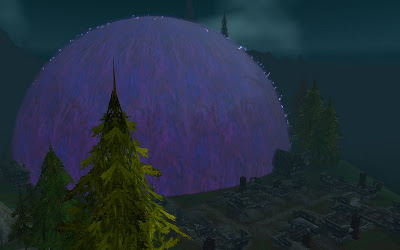
“Excuse me! Excuse me, sir!” exclaimed a voice.
A mage in the customary purple robes of Dalaran was going towards me, flanked by two armored soldiers.
“Yes?”
“My apologies sir, but no one is allowed in the ruins without permission,” he explained.
“Oh, quite all right. I lived here, once. I was wondering what it was like now.”
“Then it would be a cruelty for me to let you see what remains.”
“What about that dome?”
“I could not tell you what was behind that even if I knew. I’m simply an initiate. What is your name?”
I was sorely tempted to give my real name, but caution got the better of me.
“Talus Corestiam.”
“Ah, from Lordaeron?”
“Indeed.”
“Then we are both orphans of our own cities, doubly more for you,” he said, clasping my shoulder in solidarity. “If you wish you may spend the night here, though you’ll have to sleep in a tent.”
“Believe me, I’ve slept in much worse.”
“Ha ha! I’m Guillarme, by the way.”
Guillarme led me to a cluster of tents at which stood a large group of Dalaranese. At first they were suspicious, even when Guillarme explained that I used to be a student in Dalaran. I finally proved my skill to them by summoning a blizzard down on the meadow by the tents. This impressed the mages and they invited me to join them for supper. They gave me a bottle half-full of good, red wine. I remembered how much I’d loved the stuff when I was a student. Drinking it with the palate of undeath is only a pale reflection of the real thing. I looked at the mages around me but none looked familiar. Judging by their appearances, they were too young to have attended courses with me. They mostly talked of maintaining the perimeter around the ruin, which sounded like a terribly dull job.
I retired to a storage tent after a few hours. A surprisingly luxurious rug was spread between crates and magically sealed containers. I lifted up the tent flap to look at the shining hemisphere in the distance. I heard the strains of an accordion somewhere in the ruins, playing a Dalaranese ballad popular in my student days. The song loosened the old sights and smells lodged in my memory.
Nothing can really describe the old Dalaran for those who have never seen it. I say this not to be boastful but only to be accurate. The city was more than a collection of lovely sights and sounds, rather an amalgamation of countless different qualities. Where to begin? With the Violet Citadel, that soared into the sky, held aloft by arcane currents? With the great boulevards, where a proud citizenry once walked?
Some people have said that it was never truly night in Dalaran. The brilliant glow of enchanted sigils lit the streets at all hours, dispelling the night’s dangers. Perhaps, rather than describing the Violet Citadel and the great buildings, it would be better to tell of the places where I spent my time.
The Languorous Rose was a cafe situated by the Champion’s Square, a monument to those who died in the Second War. A sun-dappled patio stood outside the building. Walls covered with flowering vines blocked the noise from the streets, while wooden beams festooned with blossoms gave shade. The patrons, mostly students, wiled away their time, unconscious of the reality outside. The drinks (wine and tea) were good and inexpensive, and sometimes they even had rich-tasting coffee imported from the south. On Wednesdays, Fridays, and Saturdays, old Locard played the accordion in his little corner of the patio. Everything he ordered was on the house.
It is difficult to pinpoint exact moments in that paradise I knew. Instead it runs together into a medley of light and joy. I was free, or at least I felt free. No more would I live with those who thought me a dreamy shirker. I finally met with kindred souls.
I cannot recall exactly how old I was when I first came to Dalaran, though I couldn’t have been more than fourteen. What I can remember are the friends I made there. Friends like Danner, a student from Stromgarde. We could talk about anything. Both of us pursued our studies with vigor, always with a bit of rivalry. I pursued the arcane while he focused on spells of flame, a suitable choice for his mercurial temperament.
Even greater are my recollections of Emette, a tremendously intelligent girl whom I met in my second year. At times it seemed like Emette had half the student body hanging on her every word. Rather plain in appearance, her charm and friendliness made it hard not to fall in love with her. No matter how many friends she had, when you spoke to her you felt as if you were the living center of her world.
There were others besides Danner and Emette, and there were some rather despicable individuals in Dalaran, as there are everywhere. Whenever I think about Dalaran, (which is less and less these days, for the sake of my sanity) it is focused around the three of us in our favorite haunt, the Languorous Rose. There were our studies of course, which alternated between fascinating and dreary, and the occasional conflict that split our trio asunder. The rivalry between Danner and I sometimes extended to Emette, much to her annoyance. Danner eventually found a Stormwind girl named Valrea, which came as a relief to us.
One afternoon, not long before the troubles began, I was in the Languorous Rose reading an obtuse text about the Twisting Nether. Emette walked into the patio, her round, smiling face illuminated by a ray of sunlight. She sat down and we talked for some time, of the wonderful and inconsequential things of life. I suddenly told her that I loved her, and she smiled a perfect smile, ushering in my last, golden months in Dalaran. When I left for what I thought would be a brief sojourn in Lordaeron I promised to return as soon as possible. I do not know if Emette is alive or dead today.
Despite my present state, I must consider myself fortunate for having seen Dalaran in the brief moment of peace and plenty before the Scourge. The fading diplomatic ties of the Alliance still felt strong in Dalaran. That city was the cosmopolitan heart of humanity, a place of refined tastes and artistic beauty. Humans of Stromgarde, Lordaeron, and every other nation walked with the Dalaranese, as did elves, dwarves, and gnomes.
My account of old Dalaran is, of course, subjective. Wealth and comfort can never insure happiness. I recall Danner’s own misery, living in a place he regarded as inherently superficial. Emette and I attributed it to the traditional Stromgarder distrust of the arcane, but his unhappiness went beyond simple prejudice. My own times there were not without difficulty. There were nights when my studies overwhelmed me. If I try I can still remember the face and laugh of Kelia, whom I’d pursued ardently and unsuccessfully in my first year. I recall suffering with Danner through his periodic emotional breakdowns. Yet it takes effort to remember these sorrows. The memories of the joy come unbidden.
In my mind, old Dalaran is a sanctuary. To see it in its ruined state was almost more than I could bear. When the sun rose over the horizon the next morning I made haste to leave. It was preferable to return to Tarren Mill, and I almost wanted to forget that I was ever anything other than undead. Guillarme bade me good luck on my journey. He believed my destination to be Southshore. Beginning the long journey back to Tarren Mill, I looked back one last time at the glittering dome. Beautiful in its own way, it could never compare to what I remembered. As my memories of Dalaran grow fainter and more idealized, I wonder if anything can ever compare.
Farewell, Dalaran.
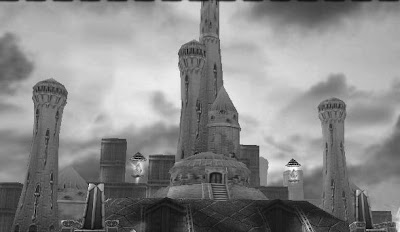
Truly beautiful.
ReplyDeleteThis is a wonderful story and I can't wait to read more.
Thank you.
ReplyDeleteHello, my name is Chihiro. :) I find your stories so wonderful and creative. To think of Azeroth in such an illustrative manner brings so much more enthusiasm to the game, yet always through the eyes of a living world; not like the static in-game version. Thank you for the beautiful art you post!
ReplyDeleteT~T ... I want to hug your protagonist.
ReplyDeleteBeautifully depicted, really. I have been reading this since yesterday, after a recommendation on TvTropes, but it is only now that I get to praise the very atmospheric descriptions and style full of little sub-stories of what individual glimpses of the setting could be like. Your writing style really has its way of drawing someone in.
All these different illustrations are fantastic additions to the stories. Not a one feels out of place, nor a single picture of Destron or other characters less than a match to their spirit.
ReplyDeleteNorbert Toth is an amazing artist!
Delete